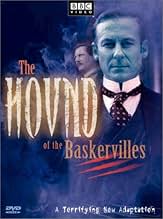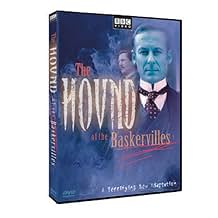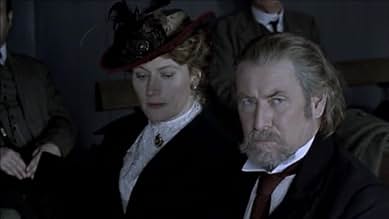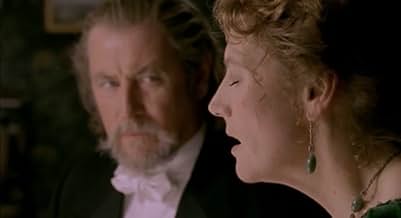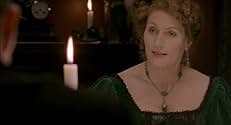The Hound of the Baskervilles
- Filme para televisão
- 2002
- 1 h 40 min
AVALIAÇÃO DA IMDb
6,5/10
2,8 mil
SUA AVALIAÇÃO
Adicionar um enredo no seu idiomaSherlock Holmes and Dr. Watson investigate after being told an heir's estate is plagued by a ghostly dog.Sherlock Holmes and Dr. Watson investigate after being told an heir's estate is plagued by a ghostly dog.Sherlock Holmes and Dr. Watson investigate after being told an heir's estate is plagued by a ghostly dog.
- Direção
- Roteiristas
- Artistas
- Indicado para 1 prêmio BAFTA
- 1 indicação no total
- Direção
- Roteiristas
- Elenco e equipe completos
- Produção, bilheteria e muito mais no IMDbPro
Avaliações em destaque
Call me crazy, but when you're adapting one of the longest Sherlock Holmes stories -- in under two hours -- there's little room to go off on tangents that aren't present in the original plot, much less omit major plot development.
Comment guidelines forbid discussing plot details, which makes it impossible to discuss how egregiously the story has been warped. In brief: the wrong person ends up in quicksand, no one should be hanged, only one person should be gnawed by any kind of animal, there's no seance or pantomime, and the Hound effects are embarrassing.
This version of The Hound of the Baskervilles also has a Holmes who drugs himself during his cases, when, presumably, he would need to concentrate. Need I point out that Holmes used drugs between cases, when he was bored, not while he was working?
On the bright side, Richard Grant was excellent as Jack Stapleton. I only wish the script were equal to his performance.
Comment guidelines forbid discussing plot details, which makes it impossible to discuss how egregiously the story has been warped. In brief: the wrong person ends up in quicksand, no one should be hanged, only one person should be gnawed by any kind of animal, there's no seance or pantomime, and the Hound effects are embarrassing.
This version of The Hound of the Baskervilles also has a Holmes who drugs himself during his cases, when, presumably, he would need to concentrate. Need I point out that Holmes used drugs between cases, when he was bored, not while he was working?
On the bright side, Richard Grant was excellent as Jack Stapleton. I only wish the script were equal to his performance.
As a fan of the Novel, and all of Doyle's Holmes stories I was initially put off by the casting of a blonde Aussie as Sherlock. And I still feel that the characters would have been closer to Doyle's original descriptions had Roxburgh and Richard E. Grant switched roles. But, having said that, I found this treatment of the novel highly entertaining, and a lot of fun. The differences from the novel served to seperate it from the book, and give me a good bit of TV that stands on it's own, as it's own story. Holmes in an alternate reality for those of you out there that follow Science Fiction, if you will. And Hart did a masterful job as Dr. John H. Watson. What was my most lasting impression of this movie ? That Richard Roxburgh, though not in his element as Holmes, gave his all. And the way he played Holmes made me think... maybe Roxburgh is the best candidate to take over the role of Doctor Who when the series returns in 2005...
I'm sorry but this was a serious disappointment. The makers seemed so desperate to make this version different that they changed or removed important characters and parts of the story. There are just too many things to list so I shall concentrate my criticism on the portrayal of Holmes and Watson.
While it is true that Watson often got annoyed with Holmes he was never so blatantly antagonistic towards him. Holmes' drug addiction was over played. Holmes only took his 7% solution when he was not on a case as form of alternative stimulus. He was not, as the film suggests, constantly indulging his addiction (and certainly not in railway station toilets).
The only two pieces of good casting were that of John Nettles as Dr Mortimer and Richard E Grant as Stapleton. I can only pray that the woefully miscast Holmes and Watson do not do any more films.
Jeremy Brett's crown as the best screen Sherlock Holmes is in no danger at all.
While it is true that Watson often got annoyed with Holmes he was never so blatantly antagonistic towards him. Holmes' drug addiction was over played. Holmes only took his 7% solution when he was not on a case as form of alternative stimulus. He was not, as the film suggests, constantly indulging his addiction (and certainly not in railway station toilets).
The only two pieces of good casting were that of John Nettles as Dr Mortimer and Richard E Grant as Stapleton. I can only pray that the woefully miscast Holmes and Watson do not do any more films.
Jeremy Brett's crown as the best screen Sherlock Holmes is in no danger at all.
Film students, gather around.
One of the best things in films to study is how different chapters of a franchise change as different artists become involved. Batman, Alien, even goobers like Halloween. Just as interesting is to compare different approaches to films that respect their material. Film versions of Hamlet for instance. There's a terrific example with "Eat Drink Man Woman" and a new carbon copy "Tortilla Soup."
Different editions of Holmes are illustrative because they really are different, radically so. And the "Hounds" seem to denote the greatest swings.
This is probably the least attentive to the written story that I know. An important pair of characters is omitted, greatly changing the mystery. The wonder about the supernatural is toned down. They added a séance, but took away the soul of the thing which was an overwhelming evidence of the supernatural untangled as the intertwined logic of three murderers.
(In the original story, the beast was an ordinary large dog with florescent paint. Here, the beast really is something a bit alien.)
So what started as a grand battle between logic and superstition, which had grand deceptions and counterdeceptions confounded by accident, which had a master, THE master involved.
Alas, the master here is actually secondary to Watson who pulls HIM out of the muck. Its a complete turnaround from the Rathbone Holmes who pulled his comic Watson from identical muck.
The overall effect is bland. There's no moody atmosphere, no champion, no deduction, no logic. There's no lust as in the original.
One wonders why anyone would watch this at all except to fill time. Unless, unless you are trying to discover why film works and what discovered narrative is all about.
Ted's Evaluation -- 1 of 3: You can find something better to do with this part of your life.
One of the best things in films to study is how different chapters of a franchise change as different artists become involved. Batman, Alien, even goobers like Halloween. Just as interesting is to compare different approaches to films that respect their material. Film versions of Hamlet for instance. There's a terrific example with "Eat Drink Man Woman" and a new carbon copy "Tortilla Soup."
Different editions of Holmes are illustrative because they really are different, radically so. And the "Hounds" seem to denote the greatest swings.
This is probably the least attentive to the written story that I know. An important pair of characters is omitted, greatly changing the mystery. The wonder about the supernatural is toned down. They added a séance, but took away the soul of the thing which was an overwhelming evidence of the supernatural untangled as the intertwined logic of three murderers.
(In the original story, the beast was an ordinary large dog with florescent paint. Here, the beast really is something a bit alien.)
So what started as a grand battle between logic and superstition, which had grand deceptions and counterdeceptions confounded by accident, which had a master, THE master involved.
Alas, the master here is actually secondary to Watson who pulls HIM out of the muck. Its a complete turnaround from the Rathbone Holmes who pulled his comic Watson from identical muck.
The overall effect is bland. There's no moody atmosphere, no champion, no deduction, no logic. There's no lust as in the original.
One wonders why anyone would watch this at all except to fill time. Unless, unless you are trying to discover why film works and what discovered narrative is all about.
Ted's Evaluation -- 1 of 3: You can find something better to do with this part of your life.
Am a huge fan of Sherlock Holmes and get a lot of enjoyment out of Arthur Conan Doyle's stories. 'The Hound of the Baskervilles' is one of the, perhaps even THE, most famous Sherlock Holmes stories and is the most adapted. For good reason, it is such a thrilling and scary story and contains a tantalising mystery.
This 2002 adaptation could have been better and is not in the same league as those of Jeremy Brett, Basil Rathbone and Peter Cushing, all wonderful and with vastly superior interpretations of Holmes. While one of the lesser adaptations of 'The Hound of the Baskervilles', it's not the worst. It is better than the Matt Frewer film and although it needs to be re-watched remember the Peter Cook film being an abomination (from personal experience, while there have been a fair share of changes most of my re-watches have seen my opinions unchanged).
Certainly there are plus points. On the most part, 'The Hound of the Baskervilles' looks great. There is a real creepiness and authenticity to the settings and production design and the costumes show a careful eye for detail. It's beautifully photographed. The music is suitably eerie.
Writing intrigues and entertains, while there are some genuinely creepy and suspenseful moments. Especially the opening and the attack on Seldon, as well as some of the build ups. It's paced in a lively fashion while still having some breathing space. Direction is competent enough at some points but low key in others.
Of the acting, the standouts are Ian Hart's loyal Watson (to me one of the best, most interesting and most faithful interpretations) and Richard E. Grant's skin crawling Stapleton (have only seen him creepier in the 'Trial and Retribution' episode he featured in). John Nettles is also splendid, and Danny Webb fares decently as Lestrade. Really liked Holmes and Watson's loyal yet strained chemistry and Watson featuring heavily in the second half which made him more interesting.
Was more conflicted though on Richard Roxburgh. Didn't mind the lack of physical resemblance, for me he did a serviceable enough job and has some charisma but he is also a bit bland and pales in comparison to very stiff competition, particularly Brett and Rathbone. Holmes could have been written somewhat better too, much has been said about the over-emphasised and out of character drug use (he did them, but not how depicted here) and his deductions seemed too convenient and telegraphed somehow.
Matt Day to me was a dull Sir Henry and Neve McKintosh, while lovely, seemed too modern for the period and the character is gratuitously treated here.
Also felt there were dull stretches, with the party and séance sequences feeling like padding. The hound effects are really quite dreadful, looking like something out of the 50s or earlier except worse looking, the culprit is obvious far too early (even for those familiar with the story or knows it inside out) and the ending is confused, rushed and anti-climactic, as well as missing the point of the ending, story and title.
In summary, not bad but could have been better. 6/10 Bethany Cox
This 2002 adaptation could have been better and is not in the same league as those of Jeremy Brett, Basil Rathbone and Peter Cushing, all wonderful and with vastly superior interpretations of Holmes. While one of the lesser adaptations of 'The Hound of the Baskervilles', it's not the worst. It is better than the Matt Frewer film and although it needs to be re-watched remember the Peter Cook film being an abomination (from personal experience, while there have been a fair share of changes most of my re-watches have seen my opinions unchanged).
Certainly there are plus points. On the most part, 'The Hound of the Baskervilles' looks great. There is a real creepiness and authenticity to the settings and production design and the costumes show a careful eye for detail. It's beautifully photographed. The music is suitably eerie.
Writing intrigues and entertains, while there are some genuinely creepy and suspenseful moments. Especially the opening and the attack on Seldon, as well as some of the build ups. It's paced in a lively fashion while still having some breathing space. Direction is competent enough at some points but low key in others.
Of the acting, the standouts are Ian Hart's loyal Watson (to me one of the best, most interesting and most faithful interpretations) and Richard E. Grant's skin crawling Stapleton (have only seen him creepier in the 'Trial and Retribution' episode he featured in). John Nettles is also splendid, and Danny Webb fares decently as Lestrade. Really liked Holmes and Watson's loyal yet strained chemistry and Watson featuring heavily in the second half which made him more interesting.
Was more conflicted though on Richard Roxburgh. Didn't mind the lack of physical resemblance, for me he did a serviceable enough job and has some charisma but he is also a bit bland and pales in comparison to very stiff competition, particularly Brett and Rathbone. Holmes could have been written somewhat better too, much has been said about the over-emphasised and out of character drug use (he did them, but not how depicted here) and his deductions seemed too convenient and telegraphed somehow.
Matt Day to me was a dull Sir Henry and Neve McKintosh, while lovely, seemed too modern for the period and the character is gratuitously treated here.
Also felt there were dull stretches, with the party and séance sequences feeling like padding. The hound effects are really quite dreadful, looking like something out of the 50s or earlier except worse looking, the culprit is obvious far too early (even for those familiar with the story or knows it inside out) and the ending is confused, rushed and anti-climactic, as well as missing the point of the ending, story and title.
In summary, not bad but could have been better. 6/10 Bethany Cox
Você sabia?
- CuriosidadesThe dinner conversation about the limits of Holmes' knowledge (literature, astronomy, politics, etc) is taken from a list made by Dr. Watson in Sir Arthur Conan Doyle's first Holmes story, 'A Study in Scarlet.'
- Erros de gravaçãoWhen Holmes and Watson are seen at Exeter railway station, behind them is a truck marked "SR". This would refer to Southern Railways, which was not formed until 1923, some time after the period the film is supposedly set.
- Citações
Dr. John Watson: [throws his coat to pull Holmes out of a quicksand on the moor] Now to put my tailor to the test.
[pulls Holmes out]
Sherlock Holmes: Three cheers for Savile Row!
- ConexõesFeatured in Troldspejlet: Episode #31.9 (2004)
- Trilhas sonorasI Saw Three Ships
(uncredited)
Traditional
Principais escolhas
Faça login para avaliar e ver a lista de recomendações personalizadas
Detalhes
- Data de lançamento
- País de origem
- Central de atendimento oficial
- Idioma
- Também conhecido como
- O Cão dos Baskervilles
- Locações de filme
- Empresas de produção
- Consulte mais créditos da empresa na IMDbPro
Contribua para esta página
Sugerir uma alteração ou adicionar conteúdo ausente

